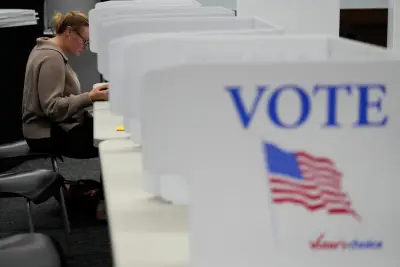Court restricts who can bring voting rights challenges in a case involving voters with disabilities

By GARY FIELDS Associated Press WASHINGTON AP A federal appeals court panel on Monday ruled that private individuals and organizations cannot bring voting rights cases under a section of the law that allows others to assist voters who are blind disabled or unable to read It s the latest ruling from the St Louis-based th Circuit Court of Appeals saying only the authorities can bring lawsuits alleging violations of the Voting Rights Act The findings upend decades of precedent and will likely be headed to the U S Supreme Court The affair centered on whether an Arkansas state law that limits how a large number of voters can be assisted by one person conflicts with Section of the landmark federal law The opinion from the three-judge panel followed the reasoning of another th Circuit panel in a previous circumstance from That opinion held that the Arkansas State Conference NAACP and the Arkansas Community Approach Conference could not bring cases under Section of the Voting Rights Act Like the provision at issue in Arkansas State Conference we conclude the text and structure of Section do not create a private right of action stated the decision written by Judge L Steven Grasz a nominee of President Donald Trump Likewise we conclude no private right of action is created by the Supremacy Clause Related Articles Trump says he ended friendship with Epstein because he stole people that worked for me Trump is getting the world market he wants but the danger to improvement could spoil his supremacy lap Trump seeks quick Murdoch deposition in Wall Street Journal lawsuit over Epstein story Judge blocks Trump administration s efforts to defund Planned Parenthood Trump says he wants Netanyahu to make sure they get the food in Gaza amid humanitarian emergency In the previous affair the district court judge reported he could not reach an opinion on the merits because the plaintiffs did not have standing under Section and gave the Justice Department five days to join the occurrence The circuit court panel agreed with his reasoning in a - decision The th Circuit which covers Arkansas Iowa Minnesota Missouri Nebraska North Dakota and South Dakota has issued three rulings holding that individuals and private entities don t have standing to bring challenges against voting laws The other came in May in a lawsuit over North Dakota redistricting In that situation the Spirit Lake Tribe and Turtle Mountain Band of Chippewa Indians with reservations miles apart argued that the state s legislative map violated the Voting Rights Act by diluting their voting strength and ability to elect their own candidates The appeals court ruled in a - decision that only the U S Department of Justice could bring such lawsuits and the full circuit declined to take up the incident The U S Supreme Court blocked the ruling last week while it decides whether to hear the affair The Justice Department declined to comment on whether it would be intervening in the Arkansas event It earlier declined to comment on the matter involving the two North Dakota tribes The Mexican American Legal Defense Fund which is representing the plaintiffs in the lawsuit revolving around voters with disabilities declined to comment on Monday s ruling Sophia Lin Lakin director of the Voting Rights Project for the ACLU reported she wasn t surprised by the ruling given the decisions in the earlier cases I think it s crucial to keep focus on the fact that the th Circuit s decisions are radical and utterly at odds with decades of precedent including from the Supreme Court itself as well as the text history and purpose of the Voting Rights Act commented Lakin who was one of the attorneys in the initial Arkansas State Conference development Private litigants have been the engine of enforcement of the Voting Rights Act for sixty years Section is considered one of the more consequential parts of the Voting Rights Act that remains intact after a Supreme Court decision removed Section That section required that all or parts of states with a history of discrimination in voting get approval from the federal ruling body before changing their voting and voting laws
